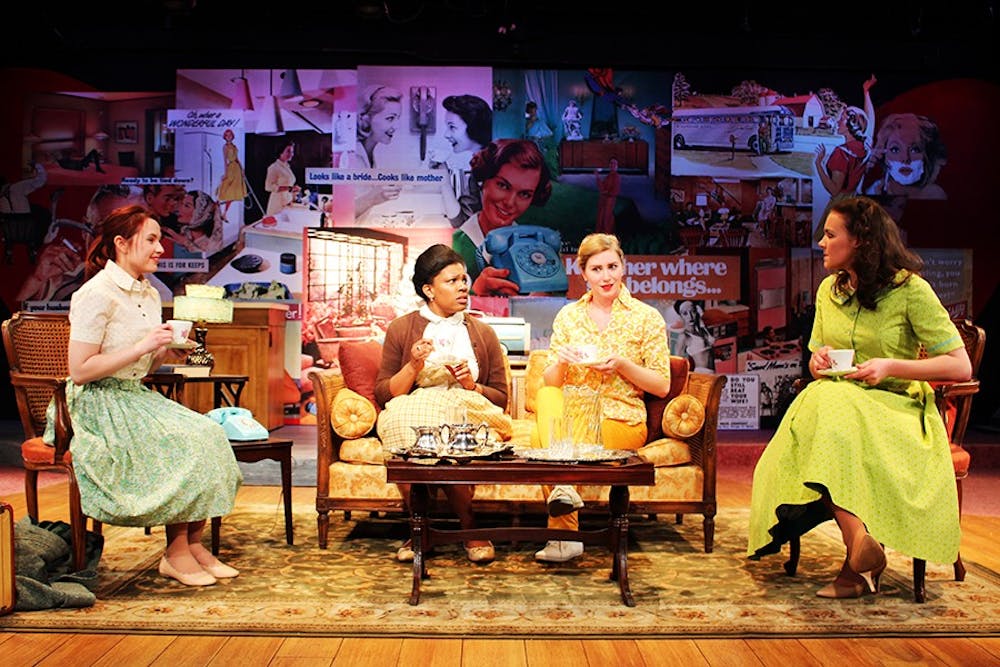Doo-wop meets amphetamines meets Greek tragedy. The Miami Department of Theatre's production of "BLISS (or, Emily Post is Dead!)" by award-winning playwright Jami Brandli explored the heroines' journey in a thought-provoking way that didn't fail to keep the audience laughing.
"BLISS (or, Emily Post is Dead!)" transports four mythological Greek heroines, Medea, Clytemnestra, Antigone and Cassandra into 1960s New Jersey in a story that elegantly navigates the trials and triumphs women have faced for millennia. As director Darin Anthony wrote in the program, "This is not about the Greeks. This is not about cleverness and word craft. This is about women and how they have been treated for thousands and thousands and thousands of years."
The play gleefully deconstructs the ideals represented by Emily Post, the paragon of etiquette and high society, and, in a truly Sophoclean manner, reminds us all that we are not necessarily bound by expectations or destiny.
Brandli's script was timely, reminding the audience that women, and particularly women of color, have faced skepticism regarding their experiences from ancient times to the 1960s to modern day. Cassandra's storyline about a woman who sees the truth and has no one believe her felt especially poignant. Anthony remarked that "what Jami, the playwright, has done, is created a very pretty package to deliver an important and challenging message: This has got to change."
The performances were powerful and transformative. The mostly-female cast was refreshing, tender and playful in equal measure and made all the more poignant by the arresting set designed by Gabi Pezoa.
Playing Maddie/Medea, Taylor Hayes managed to find surprising humor in her tragic role and captivated the audience as she channeled Medea's wrath and lunacy. Jada Harris, as Cassandra, navigated her heart-wrenching character with poise and dignity and gave her stirring monologues with strong emotion without ever seeming melodramatic.
Perhaps the most touching scenes were those with Rachel Brandenburg as Antonia/Antigone, who intensified her role by reminding us that the legend of Antigone is not only that of a noble sacrifice but also a coming-of-age story. Adam Joesten (Apollo, Doctor Smith, Uncle) transitioned between his roles with ease and, as Apollo in particular, injected some much needed humor into his dark storyline. However, some actors fell flat in scenes that could have been more emotional, and there were a few stumbles, but overall the entire cast demonstrated an exceptional ability and stage presence.
Pezoa's set featured disturbing images and quotes from sexist ads from the 1950s and 1960s contained in two halves of a red heart. Pezoa remarked that she felt the play "deals primarily in restraint" and that she was interested in "capturing that pressure in a graphic, engaging way."
The prominent display of the words "Keep her in her place" and a picture of a housewife bound with rope in a living room reinforced not only the powerless positions many housewives felt themselves to be in during this era, but also the Greek themes of being trapped by one's fate. The lighting scheme, designed by Cassie Mings expertly heightened tension and highlighted the most powerful lines.
The costume design, planned by Melanie Mortimore, was beautifully executed, transporting the story into proper '60s society. Mortimore wrote that she envisioned Clementine "on the crux of a change," and this is evident through the way she dresses in Keds and slacks, rejecting the pristine Jackie Kennedy-esque tea dresses of the other women. The design for Antonia was also cleverly planned, illustrating her journey from timid teenager to revolutionary young woman.
The themes explored in this performance were complex and maneuvered with an elegant dexterity that would have made Emily Post herself proud.
4/5 Stars

